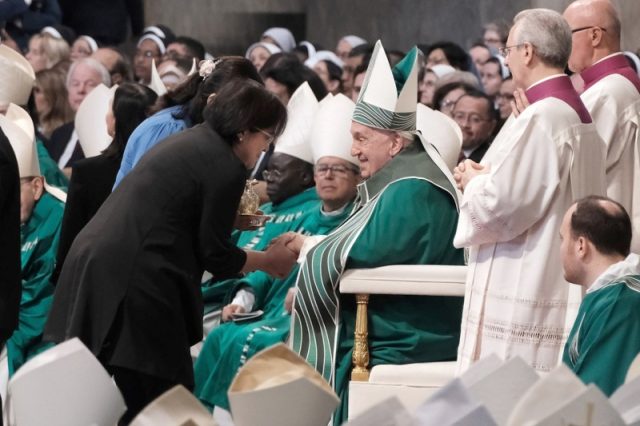
ROME — With some 50 other women, pastoral worker Estela Padilla broke one of the hardest glass ceilings at the Vatican.
Padilla, 60, was one of the women given voting rights at the just-concluded Synod on Synodality, an assembly that itself sought greater participation of laypeople, especially women, in decision-making in the Catholic Church.
Synods have previously been a bishops — and therefore a male-only affair, and the body instituted by St. Paul VI to continue the collegiality of the Vatican II, the council that modernized the Church, is still called the “Synod of Bishops.” But for the first time there are “synod mothers” aside from synod fathers.
Still, Padilla, a lay theologian with the Bukal ng Tipan grassroots ministry, had no illusions about the kind of odds faced by those who “do not belong to the center” in the top-level Vatican meeting that, while strictly not a parliamentary body, can make important recommendations to the pope.
Padilla rubbed elbows with prominent Catholic women leaders such as Sr. Nathalie Becquart, the French religious who is the first woman to become undersecretary, or No. 2, of the Vatican assembly; Sr. Mary Teresa Barron, president of the global organization of women superiors general; and fellow theologian Christina Kheng of Singapore, who authored a book about “conversations with the spirit,” the synod’s signature method of listening and discernment.
Officially the Second Session of the 16th Ordinary General Assembly of the Synod of Bishops, the gathering ended on October 27 with 355 voting members approving a 155-paragraph final document that proposed synodality at all levels as a way forward for the Church.
Pope Francis has chosen not to write an apostolic exhortation, the magisterial or teaching document that is usually published post-synod. But he ordered the final report published immediately, and synod officials said the pope had considered it adopted.
It’s still a tall order as synodality will go against millennia of culture and hierarchical, top-to-bottom policy- and decision-making.
The report called for a culture of transparency, accountability, and evaluation and insisted on mandatory participatory councils in the Church, an issue raised at all levels of synod consultations and in a 2023 synthesis report.
“There’s a big change in structure mentioned in the document,” Padilla told CBCP News.
“All the structures of leadership are there so that we can be more missionary. So they are not there for themselves,” she said.
Synodality as spirituality
The final document defined synodality as the “walking together of Christians with Christ and towards God’s Kingdom, in union with all humanity.”
Padilla clarified that roles are “differentiated” and the Church hierarchy will continue to exist — “the bishop remains the bishop and the pope remains the pope.”
Viewed as a spirituality, however, synodality recognizes that a thread runs through well-entrenched Church structures.
“That is the thread of humility for one. You’re here to listen to one another and all of you to listen to the spirit,” Padilla said.
Because ministry is “trust,” Church leaders and bishops in particular must be accountable, not only to superiors but also to their communities, she said.
The call for greater lay participation is not new as Vatican II had declared the laity as “sharers in the role of Christ as priest, prophet, and king.”
But this time, the spirituality demanded by the synod requires the Church to reach out to the marginalized, a major theme of Pope Francis’ papacy.
At the synod’s first session last year, Padilla brought her experiences with basic ecclesial communities or BECs, neighborhood groups led by lay people that conduct bible-reading and prayer, as well as help one another. BECs, which sprouted in the Philippines and Brazil in the late 1960s, had been touted as a “new way of being church.”
Yet even BECs draw mostly people from the center, the regular church-goers and parish workers.
“Tayo-tayo lang parati sa simbahan e. Ninety percent sa atin, hindi naman nagsisimba, ‘di ba?” Padilla pointed out.
“So the spirit of synodality is the other, or the other who is not like you,” she said.
Naming the marginalized
In the synod’s final document, it was important to give the “marginalized” a name, not just lump them together under one catch-all term, Padilla said.
Padilla said discussions took the entire four weeks of the synod’s second session to ensure that due recognition for the marginalized, including the poor, divorced persons, and the LGBT or lesbians, gays, and bisexual and transgender persons, made it to the document.
Paragraph 50 of the final document reads: “Many participants were delighted and surprised to be asked to join this journey and to be given the opportunity to have their voice heard in the community. Unfortunately, others continued to experience the pain of feeling excluded or judged because of their marital situation, identity or sexuality.”
The paragraph received 333 votes, while 22 voted against it.
“We started with listening. Let’s not stop with silencing…The marginalized are always lumped under ‘marginalized,’” Padilla said.
Padilla admitted that voting was tense up to the last minute.
The paragraph about the role of women in the Church, Paragraph 60, which stated that the question of ordaining women as deacons remained open, received the most negative votes, totaling 97.
The “sense of the faithful” however worked wonders despite differences among synod fathers and mothers, Padilla said.
The final document referred to the “sensus fidei,” where the faithful are deemed inerrant in matters of belief, but as a product of discernment and “not to be confused with public opinion.” It echoed Vatican II’s dogmatic constitution on the Church, Lumen Gentium, which spoke of a “sensus fidei” or universal consensus on matters of faith.
“At first, I doubted how the sense of faith of the faithful — that if we gathered together, God will speak through us — will work,” Padilla said.
“But I saw it here. In spite of the differences, the People of God spoke.”









